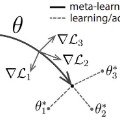Recently Implicit Neural Representations (INRs) gained attention as a novel and effective representation for various data types. Thus far, prior work mostly focused on optimizing their reconstruction performance. This work investigates INRs from a novel perspective, i.e., as a tool for image compression. To this end, we propose the first comprehensive compression pipeline based on INRs including quantization, quantization-aware retraining and entropy coding. Encoding with INRs, i.e. overfitting to a data sample, is typically orders of magnitude slower. To mitigate this drawback, we leverage meta-learned initializations based on MAML to reach the encoding in fewer gradient updates which also generally improves rate-distortion performance of INRs. We find that our approach to source compression with INRs vastly outperforms similar prior work, is competitive with common compression algorithms designed specifically for images and closes the gap to state-of-the-art learned approaches based on Rate-Distortion Autoencoders. Moreover, we provide an extensive ablation study on the importance of individual components of our method which we hope facilitates future research on this novel approach to image compression.
翻译:最近隐含的神经图示(INRs)作为各种数据类型的新颖而有效的代表形式受到关注。迄今为止,先前的工作主要侧重于优化其重建性能。这项工作从新颖的角度调查IRS,即作为图像压缩的工具。为此,我们提议了以IRS为基础的首个全面压缩管道,包括量化、量化认知再培训和加密编码。与IRS的编码,即过度适应数据样本,通常在数量上变慢。为了减轻这一缺陷,我们利用基于MAML的元学初始化方法,在较少的梯度更新中达到编码,这通常也会提高IRS的率扭曲性能。我们发现,我们利用IRS进行压缩的方法大大超出先前的类似工作,与专门为图像设计的通用压缩算法具有竞争力,并缩小基于利率-调控自动算器的状态学方法的差距。此外,我们提供了有关我们方法中各个组成部分的重要性的广泛关联性研究,我们希望通过这种方法促进未来对图像的压缩。
相关内容
- Today (iOS and OS X): widgets for the Today view of Notification Center
- Share (iOS and OS X): post content to web services or share content with others
- Actions (iOS and OS X): app extensions to view or manipulate inside another app
- Photo Editing (iOS): edit a photo or video in Apple's Photos app with extensions from a third-party apps
- Finder Sync (OS X): remote file storage in the Finder with support for Finder content annotation
- Storage Provider (iOS): an interface between files inside an app and other apps on a user's device
- Custom Keyboard (iOS): system-wide alternative keyboards
Source: iOS 8 Extensions: Apple’s Plan for a Powerful App Ecosystem



